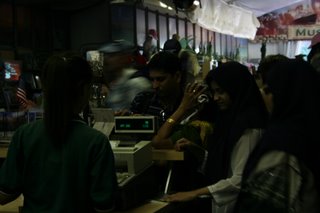 This week marked the first day of school for many students and parents. Time to get back in the groove. Teachers, by the way, have been at it for a few weeks, ahead of the start of the semester.
This week marked the first day of school for many students and parents. Time to get back in the groove. Teachers, by the way, have been at it for a few weeks, ahead of the start of the semester.I just came across an astounding story in the next issue of Time Magazine. And I want to construct the proper context in which this tale is told. In Texas, public schools continue to struggle, despite the No-Child Left-Behind good-intentions, literacy initiatives and some genuine education success stories.
It’s still not enough…yet, there’s a sinister undercurrent still eroding the basic pillars of education: elbow grease, brain power, and homework.
The University of Michigan studied 2,900 kids a couple of years ago and discovered the time spent on homework is up 51% since 1981. The Associated Press and AOL ran a poll earlier this year and found elementary school kids are spending an average of 78-minutes a night on work outside the classroom.
Interestingly, a Duke University study concludes "homework does not measurably improve academic results for grade school students." (Note—there’s that metric issue again: how do you measure success in public schools?) The Duke study also found homework to result in slightly better ROI for middle- and high-school students, but more than 2-hours a night yielded lower test scores.
Apparently, this correlation is universal.
The Time article notes that many of the nations that outperform the U.S. on student achievement tests--such as Japan, Denmark and the Czech Republic—have lower homework loads, but low-scoring countries like Greece, Thailand and Iran really pile on the books.
Homework is more than about learning the course material. Homework also builds study habits, self-discipline and time-management skills. At what level, however, is too much homework a detriment to kids' interest in learning. At what point does the path to knowledge become a drag on discovery, and undermine natural curiosity?
Critics of public schools’ addiction to homework are seeking radical solutions, like a default no-homework policy, exceptions being tasks like interviewing parents on family history, kitchen chemistry and family reading.
There is another harsh reality in that 71% of mothers of kids under 18 are in the workforce. Some are talking about extending the school day or year beyond its agrarian-based calendar, which would allow students to do more work at school and save evenings for family and serendipity.
That theory looks good on paper.
But when many fractured families have defaulted to entertaining kids with TV, it is doubtful much “quality time” is going to be spend in familial serendipity. That gambit is more likely to result in more TV viewing time.
Should there be a sensible homework policy, perhaps 10 min. a night per grade level?
Perhaps.
Depends upon the quality of those minutes spent in study.
What about a nightly time limit, a policy of no homework over vacations, no more than two major tests a week, fewer weekend assignments and no Monday tests?
Sounds like the inmates are taking over the asylum.
The sad truth is that many of today’s parentswho are advocating no-homework are, in fact, yesterday’s struggling students. They’re intimidated by homework they themselves wrestled with a generation earlier…and so are capitulating their responsibility as parents to augment the role of the schools in teaching their kids the finer points of reading, writing, and arithmetic.
This self-defeating attitude is a first cousin to the mentality that schools were the place to send unruly kids to teach them how to behave socially, as self-indulgent parents abdicated their responsibilities as role models. The catch-22 came when schools tried to discipline out-of-control kids, and the parents came to the defense of their children, even when the students’ behavior was clearly wrong.
I know this for a fact, listening to my father’s horror stories as a High school administrative principal in the 70’s, and my mother’s experiences as a classroom teacher into the 80’s. The policies of those decades are now coming home to roost in the 21st Century.
Mixed message to kids: anything goes, but don’t break the rules, which schools could not enforce.
Clear message to teachers: your sense of values and boundaries better not cross the line parents refuse to enforce.
No wonder we’ve got Columbine’s and Jonesboro’s staining the libraries and schoolyards of our public schools. Johnny can’t read or write, but he knows how to make a bomb and draw up a death list, and manipulate the system with the help of absent parents and the ACLU.
Are there homework assignments that are really ridiculous, and should be re-thought?
You bet.
That stupid project to build a self-propelled car with paperclips, thread spools and rubber bands was an impossibility for my 8-year old daughter, and an immense frustration to my bride and I. The outcome was a sense of defeat for the student and outrage for us. That was not a positive learning experience. It would have been a challenge for a high schooler.
Just as punishment should fit the crime, so should homework assignments find a balance between enrichment and creation of character and good study habits. It’s no replacement for quality time in the classroom, or at home.
























